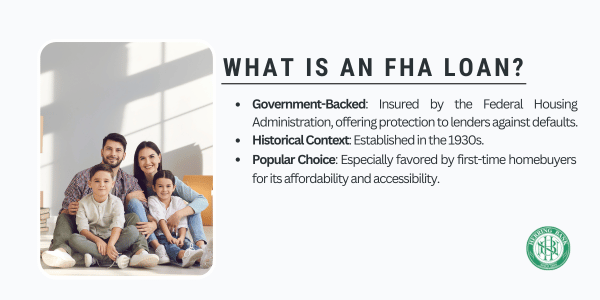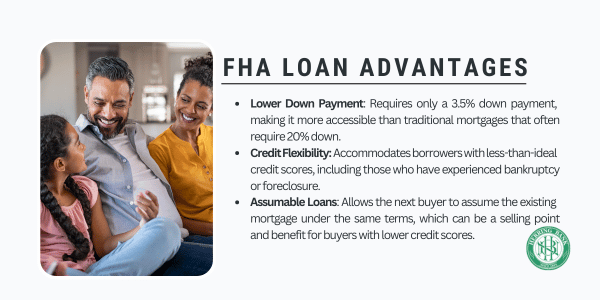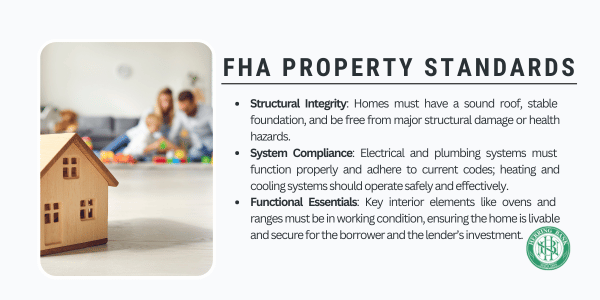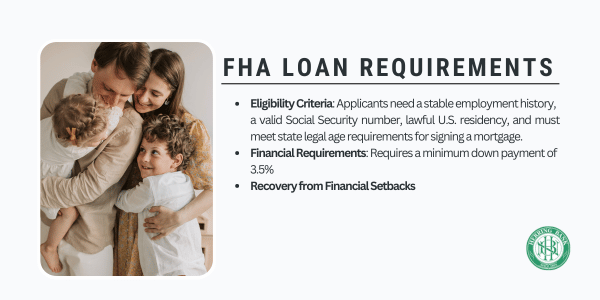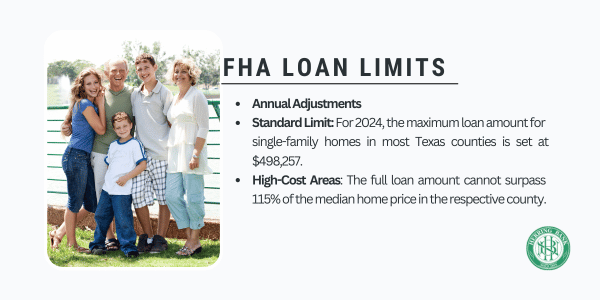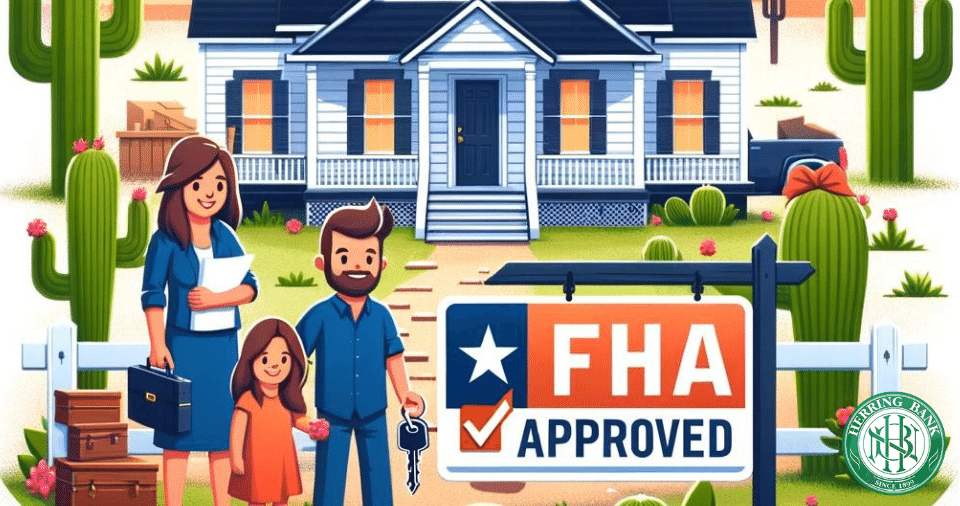
FHA Loans in Texas
What is an FHA Loan?
An FHA loan is a type of mortgage backed by the Federal Housing Administration (FHA). This arrangement means that the federal government provides insurance to lenders approved by the FHA, which helps protect them from losses if borrowers fail to make their mortgage payments. The program was established during the 1930s following a surge in foreclosures and defaults, with the dual goals of supporting lenders through government-backed insurance and boosting the housing market by making mortgages more available and affordable. Today, FHA loans are especially favored among first-time homebuyers.
What are the advantages of FHA Loans?
An FHA loan is often considered one of the more accessible mortgage options because it allows for a lower down payment and accommodates less-than-ideal credit scores. This type of loan only requires a 3.5 percent down payment. It is a viable option for borrowers who cannot afford the typical 20 percent down payment or who are ineligible for private mortgage insurance. Additionally, FHA loans are assumable, which means if you decide to sell your house, the new buyer can take over your existing mortgage under the same terms. This can be particularly beneficial for individuals with low credit scores, or those who have experienced bankruptcy or foreclosure, as they may still qualify for an FHA loan.
FHA Loan Requirements
- Employment History: Applicants must have a consistent employment record, ideally working for the same employer for at least the past two years. This demonstrates stability and reliability in income, which is critical for meeting mortgage obligations.
- Legal and Residency Requirements: Borrowers must have a valid Social Security number, be lawful residents of the U.S., and be of legal age to sign a mortgage according to state laws. This ensures that the borrower is legally eligible for a loan commitment.
- Minimum Down Payment: A minimum down payment of 3.5 percent is required. Importantly, this down payment can be gifted by a family member, which can make home ownership more accessible to first-time buyers or those with limited personal savings.
- Residence Requirements: FHA loans are strictly for primary residences, which means the borrower must live in the home. This stipulation helps the FHA ensure that the loans are used for housing stability, not for investment or rental properties.
- Property Appraisal: The property must be appraised by an FHA-approved appraiser to ensure it meets safety, security, and value standards. This protects both the lender and the borrower by ensuring the property is a worthwhile investment.
- Front-End Ratio Limits: The borrower's front-end ratio, which includes the mortgage payment and all housing expenses like HOA fees, property taxes, and insurance, should ideally be less than 31% of gross income. In some cases, approval may be possible with a ratio as high as 46.99%, but this requires strong justification and compensating factors from the lender, showcasing the lender’s confidence in the borrower's financial stability.
- Back-End Ratio Limits: The back-end ratio, which encompasses the mortgage and all other monthly debts like credit card payments and car loans, should typically be less than 43% of gross income. Approvals can extend up to 56.99% with adequate justification and compensating factors, which must be clearly outlined by the lender. This indicates a comprehensive evaluation of the borrower’s overall debt responsibilities.
- Bankruptcy Conditions: Generally, applicants need to be two years out of bankruptcy and must have re-established good credit. However, exceptions can be made for those who are one year out of bankruptcy due to extenuating circumstances, provided they have since managed their finances responsibly. This flexibility recognizes that individuals can recover from financial setbacks with proper management.
- Foreclosure Recovery Period: Typically, applicants must be three years out of foreclosure and have re-established good credit to qualify. Exceptions can be considered under extenuating circumstances, though simply moving to a new area and being unable to sell the previous home does not qualify. This policy encourages responsible credit use following significant financial distress.
These guidelines reflect the FHA's commitment to making home ownership achievable, while also ensuring that loans are provided to individuals who are likely to maintain their mortgage payments. This balance helps stimulate the housing market and protects against the risks associated with loan defaults.
FHA Property Standards Explained
FHA loans require homes to meet certain standards to ensure they are safe, secure, and structurally sound. This not only protects the borrower but also secures the lender’s investment. Here are the key components assessed:
- Roof: Must be intact without leaks, damage, or missing shingles.
- Foundation: Should be stable, level, and free from significant cracks or the need for major repairs.
- Electrical and Plumbing Systems: Must be fully functional and compliant with current codes.
- Heating and Cooling Systems: Should operate safely and effectively.
- Interior and Exterior: There should be no major structural damage or health hazards, such as lead paint, and no severe accessibility issues.
- Appliances: Essential appliances, such as ovens and ranges, must be in working condition.
It's important to note that FHA standards focus on the home’s essential functionality rather than its aesthetic appeal. While minor repairs or updates might be necessary, they generally do not disqualify a property from FHA approval.
2024 FHA Loan Limits in Texas
In Texas, the maximum amount that can be borrowed with an FHA loan varies by county and is adjusted annually based on property value changes. These variations are known as FHA Loan Limits. For 2024, most counties in Texas have set the maximum loan amount for single-family homes at $498,257. However, in higher-cost areas, the loan limits are increased. Additionally, the full loan amount must not exceed 115% of the median home price in the respective county.
Frequently Asked Questions
Is it hard to get approved for a Texas FHA loan?
It is generally easier to get approved for an an FHA loan today as compared to a conventional loan due to lower credit score requirements, lower down payment, and the ability to qualify even with past financial issues. FHA loans also offer lower interest rates to help with monthly payments.
What cities does Herring Bank provide FHA Loans in Texas?
Herring Bank provides FHA Loans in: Houston, San Antonio, Dallas, Austin, Fort Worth, El Paso, Arlington, Corpus Christi, Plano, Laredo, Lubbock, Garland, Irving, Amarillo, Grand Prairie, McKinney, Frisco, Brownsville, Pasadena, Killeen, McAllen, Mesquite, Midland, Denton, Waco and more!
What is the downside to a FHA loan in Texas?
The downside to a FHA loan includes an extra cost in the form of an upfront mortgage insurance premium, which can be either paid in cash at the time of loan or rolled into the life of the loan, along with home price qualifying maximums set by FHA.
What is an FHA loan and how does it work?
An FHA loan is a type of mortgage insured by the Federal Housing Administration, allowing you to make a low down payment and have less restrictive credit requirements than conventional mortgage loans do. The federal government insures the FHA loans, making them easier to qualify for and requiring mortgage insurance.
What are the main benefits of choosing an FHA loan over conventional loans?
Choosing an FHA loan can provide lower down payment requirements, more flexible credit score criteria, and the option to use gift funds for down payments, offering significant advantages for first-time homebuyers and individuals with limited savings or credit challenges.

